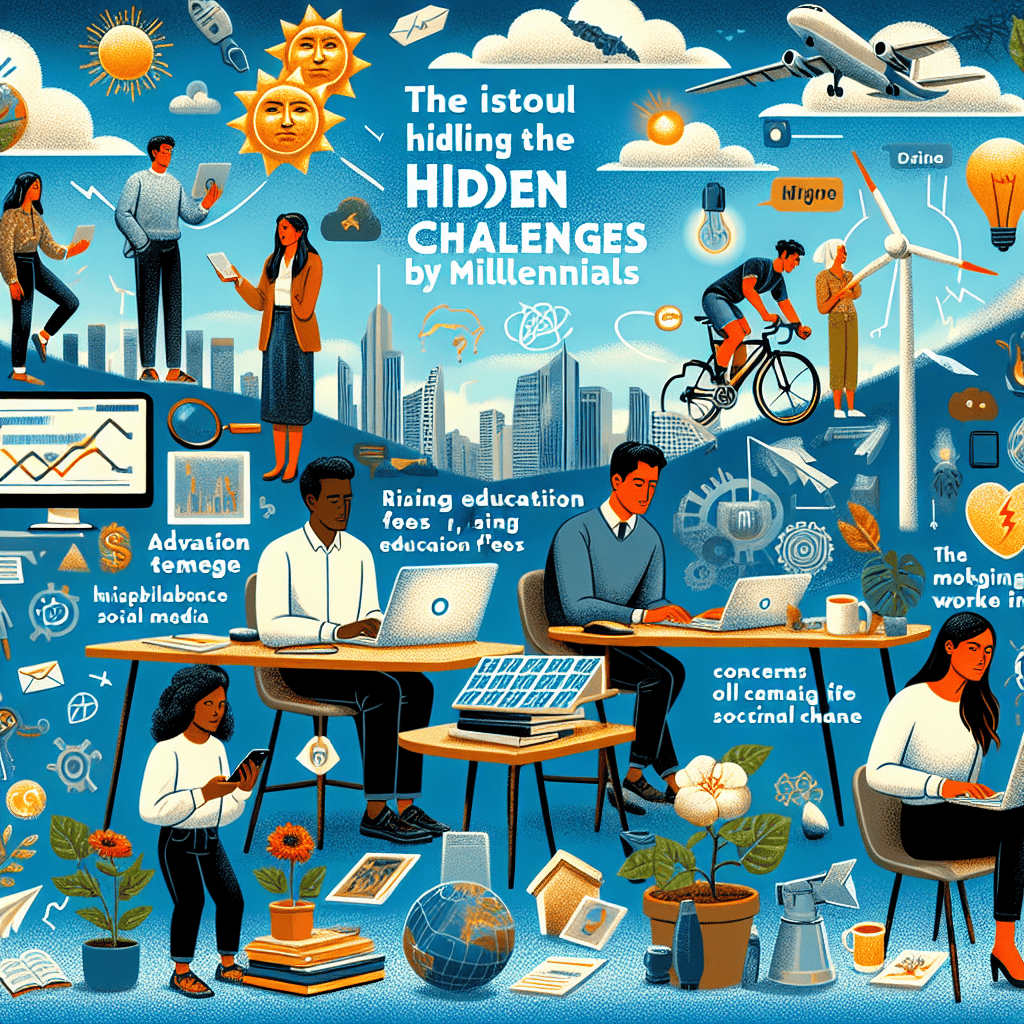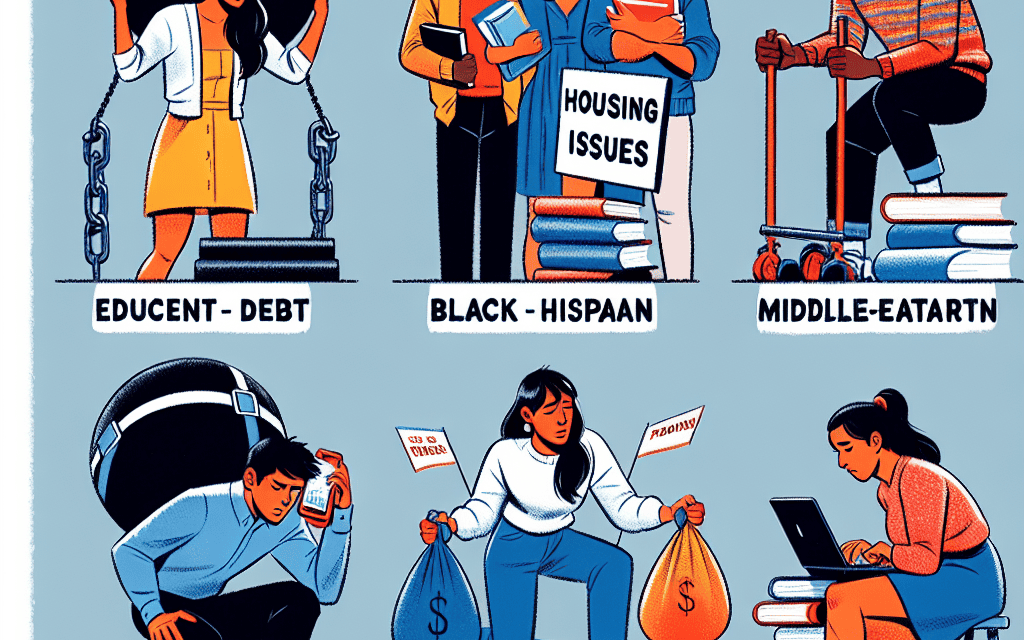“Millennials: Navigating the Unseen Struggles Behind the Success Story”
Introduction
Millennials, often characterized by their tech-savvy nature and adaptability, have been at the forefront of societal and economic transformations in the 21st century. Born between 1981 and 1996, this generation has navigated a rapidly changing world, marked by the rise of the internet, globalization, and shifting cultural norms. While they are frequently celebrated for their entrepreneurial spirit and commitment to social causes, the challenges they face are often overshadowed by their perceived successes. Beneath the surface, Millennials grapple with significant hurdles, including economic instability, mental health struggles, and the pressures of an increasingly competitive job market. These hidden challenges reveal a more complex narrative, highlighting the resilience and resourcefulness required to thrive in an era of uncertainty and change. Understanding these underlying issues is crucial to appreciating the full spectrum of the Millennial experience and the unique contributions they continue to make to society.
Navigating Financial Instability: The Millennial Struggle with Debt and Savings
Millennials, often characterized by their adaptability and technological prowess, face a unique set of financial challenges that distinguish them from previous generations. While they are frequently celebrated for their entrepreneurial spirit and digital fluency, these attributes mask a more complex financial reality. The millennial generation, born between 1981 and 1996, has come of age during a period of significant economic upheaval, which has profoundly impacted their financial stability. As they navigate the intricacies of modern financial systems, millennials are confronted with the dual burdens of debt and inadequate savings, which together create a precarious economic landscape.
One of the most pressing issues for millennials is the overwhelming burden of student loan debt. Unlike previous generations, millennials have pursued higher education at unprecedented rates, often incurring substantial debt in the process. The rising cost of tuition, coupled with stagnant wages, has left many millennials struggling to repay their loans. This financial strain is exacerbated by the fact that student loan debt is not easily dischargeable, even in bankruptcy, leaving many young adults with limited options for relief. Consequently, the weight of this debt often delays major life milestones such as homeownership, marriage, and starting a family, as millennials prioritize debt repayment over other financial goals.
In addition to student loans, millennials face a challenging job market characterized by instability and underemployment. The aftermath of the 2008 financial crisis and the more recent economic disruptions caused by the COVID-19 pandemic have resulted in a volatile employment landscape. Many millennials have experienced job losses or have been forced to accept positions that do not fully utilize their skills or education. This underemployment not only affects their immediate earning potential but also has long-term implications for career advancement and retirement savings. As a result, millennials often find themselves in a cycle of financial insecurity, struggling to build a stable economic foundation.
Moreover, the high cost of living in urban areas, where job opportunities are often concentrated, further complicates the financial picture for millennials. Housing costs have skyrocketed in many cities, making it difficult for young adults to afford rent, let alone save for a down payment on a home. This situation is compounded by rising healthcare costs and the increasing necessity of maintaining expensive technology and internet services, which are essential for both personal and professional life. These financial pressures leave little room for savings, making it challenging for millennials to build an emergency fund or invest for the future.
Despite these challenges, millennials are often criticized for their perceived lack of financial responsibility. However, this criticism overlooks the structural economic barriers that have shaped their financial reality. While it is true that some millennials may struggle with budgeting or financial planning, it is essential to recognize that their financial difficulties are often rooted in broader systemic issues. Addressing these challenges requires a multifaceted approach, including policy changes to alleviate student loan debt, initiatives to create stable and well-paying jobs, and efforts to make housing more affordable.
In conclusion, while millennials are frequently lauded for their success in navigating a rapidly changing world, it is crucial to acknowledge the hidden financial challenges they face. The combination of student loan debt, job market instability, and high living costs creates a formidable barrier to financial stability. By understanding and addressing these issues, society can better support millennials in achieving economic security and fulfilling their potential.
Mental Health Matters: Addressing Anxiety and Depression Among Millennials
Millennials, often characterized by their technological prowess and adaptability, have been at the forefront of numerous societal changes. However, beneath the surface of their apparent success lies a generation grappling with significant mental health challenges, particularly anxiety and depression. As the first generation to grow up with the internet and social media, millennials face unique pressures that previous generations did not encounter. These pressures, coupled with economic instability and shifting societal expectations, have contributed to a mental health crisis that demands attention and understanding.
To begin with, the digital age has brought about unprecedented connectivity, yet it has also fostered an environment ripe for comparison and self-doubt. Social media platforms, while offering opportunities for self-expression and community building, often present curated versions of reality that can exacerbate feelings of inadequacy and anxiety. Millennials, who are more likely than older generations to engage with these platforms, may find themselves trapped in a cycle of comparison, leading to heightened stress and a distorted sense of self-worth. This constant exposure to idealized images and lifestyles can contribute to a pervasive sense of not measuring up, fueling anxiety and depression.
Moreover, economic factors play a significant role in the mental health challenges faced by millennials. Entering the workforce during or after the Great Recession, many millennials have encountered a job market characterized by instability and competition. The pressure to secure stable employment, coupled with the burden of student loan debt, has created a financial strain that can be overwhelming. This economic uncertainty not only affects their present circumstances but also casts a shadow over their future prospects, leading to increased anxiety about long-term financial security and life goals.
In addition to economic pressures, societal expectations have evolved, placing millennials in a unique position. Traditional milestones such as homeownership, marriage, and starting a family are being delayed or redefined, often due to financial constraints or personal choice. While this shift allows for greater individual freedom, it can also lead to feelings of isolation and uncertainty. The divergence from established life paths can create a sense of disconnection from societal norms, contributing to feelings of depression and anxiety as millennials navigate uncharted territory.
Furthermore, the stigma surrounding mental health issues, although gradually diminishing, still poses a barrier to seeking help. Many millennials may feel reluctant to discuss their struggles openly, fearing judgment or misunderstanding. This reluctance can prevent individuals from accessing the support and resources they need, exacerbating their mental health challenges. It is crucial to foster an environment where mental health is prioritized and openly discussed, encouraging millennials to seek help without fear of stigma.
In light of these challenges, it is imperative to address the mental health needs of millennials with empathy and understanding. Employers, educators, and policymakers must recognize the unique pressures faced by this generation and implement strategies to support their mental well-being. This includes promoting work-life balance, providing access to mental health resources, and creating inclusive environments that prioritize mental health. By acknowledging and addressing the hidden challenges faced by millennials, society can help alleviate the burden of anxiety and depression, allowing this generation to thrive both personally and professionally. As we continue to uncover the complexities of millennial life, it becomes increasingly clear that mental health matters, and addressing these issues is essential for the well-being of an entire generation.
The Gig Economy Dilemma: Job Insecurity and Career Uncertainty
The gig economy has emerged as a defining feature of the modern labor market, particularly for millennials, who have embraced its flexibility and autonomy. However, beneath the surface of this seemingly liberating work model lies a complex web of challenges that contribute to job insecurity and career uncertainty for this generation. As millennials navigate the gig economy, they encounter a landscape that is both promising and precarious, revealing hidden challenges that extend beyond the allure of success.
To begin with, the gig economy offers millennials the opportunity to break free from traditional nine-to-five jobs, allowing them to pursue diverse interests and maintain a work-life balance that aligns with their personal values. This flexibility is particularly appealing to a generation that values experiences over material possessions and seeks to integrate work with personal fulfillment. However, this freedom comes at a cost. The lack of stable employment contracts and benefits such as health insurance, retirement plans, and paid leave leaves gig workers vulnerable to financial instability. Consequently, many millennials find themselves in a constant state of uncertainty, struggling to make ends meet while lacking the safety net that traditional employment provides.
Moreover, the gig economy’s emphasis on short-term contracts and project-based work can hinder long-term career development. Unlike traditional career paths that offer clear progression and opportunities for skill enhancement, gig work often lacks structured growth trajectories. This can lead to a fragmented career narrative, making it challenging for millennials to build a cohesive professional identity. As a result, they may find it difficult to demonstrate their expertise and experience to potential employers, further exacerbating their career uncertainty.
In addition to these structural challenges, the gig economy also fosters a competitive environment that can be mentally and emotionally taxing. With an ever-growing pool of freelancers and independent contractors, millennials must constantly market themselves and their skills to secure work. This relentless self-promotion can lead to burnout and a sense of inadequacy, as individuals are pressured to continuously prove their worth in a saturated market. Furthermore, the lack of a supportive workplace community can contribute to feelings of isolation and disconnection, as gig workers miss out on the camaraderie and collaboration that traditional office settings often provide.
Despite these challenges, it is important to recognize that the gig economy is not inherently detrimental. For many millennials, it offers a viable alternative to conventional employment, enabling them to pursue entrepreneurial ventures and explore diverse career paths. However, to address the hidden challenges of job insecurity and career uncertainty, there is a need for systemic changes that can provide gig workers with greater stability and support. Policymakers and industry leaders must collaborate to develop innovative solutions, such as portable benefits and fair labor standards, that can protect the rights and well-being of gig workers.
In conclusion, while the gig economy presents millennials with unique opportunities for flexibility and autonomy, it also poses significant challenges that can undermine their financial security and career development. By acknowledging and addressing these hidden challenges, society can work towards creating a more equitable and sustainable labor market that empowers millennials to thrive beyond the pursuit of success. As we continue to explore the complexities of the gig economy, it is crucial to strike a balance between embracing its potential and mitigating its risks, ensuring that the future of work is both inclusive and resilient.
Housing Market Hurdles: Millennials and the Dream of Homeownership

The millennial generation, often characterized by its adaptability and technological prowess, faces a unique set of challenges in the pursuit of homeownership. Despite being the most educated generation in history, millennials encounter significant hurdles in the housing market that are often overshadowed by their perceived success in other areas. As they navigate the complexities of modern life, the dream of owning a home remains elusive for many, primarily due to economic and societal factors that have reshaped the landscape of homeownership.
To begin with, the economic environment in which millennials have come of age has been less than favorable. The aftermath of the 2008 financial crisis left a lasting impact on this generation, many of whom entered the workforce during a period of economic instability. This timing has had long-term repercussions, including stagnant wages and limited job opportunities, which have hindered their ability to save for a down payment. Furthermore, the burden of student loan debt, which has reached unprecedented levels, further complicates their financial situation. With a significant portion of their income allocated to repaying loans, millennials find it challenging to accumulate the necessary savings to enter the housing market.
In addition to these economic constraints, the housing market itself presents formidable obstacles. Over the past decade, housing prices have surged, outpacing wage growth and making it increasingly difficult for first-time buyers to afford a home. This disparity is particularly pronounced in urban areas, where many millennials reside due to job opportunities and lifestyle preferences. Consequently, the dream of homeownership often requires relocating to more affordable regions, which may not align with their career aspirations or personal desires.
Moreover, the stringent lending standards imposed by financial institutions further exacerbate the situation. In the wake of the financial crisis, banks have implemented more rigorous criteria for mortgage approval, prioritizing applicants with substantial down payments and impeccable credit scores. For millennials, who may not have had the opportunity to build a robust credit history, these requirements can be prohibitive. As a result, many are forced to delay homeownership or explore alternative housing arrangements, such as renting or cohabiting with family members.
Despite these challenges, it is important to recognize the resilience and resourcefulness of the millennial generation. Many are exploring innovative solutions to overcome these barriers, such as participating in shared equity programs or utilizing technology-driven platforms to access more affordable housing options. Additionally, some millennials are redefining the concept of homeownership altogether, embracing the idea of co-living spaces or investing in tiny homes as a means to achieve their housing goals.
In conclusion, while millennials have made significant strides in various aspects of their lives, the path to homeownership remains fraught with challenges. Economic constraints, rising housing costs, and stringent lending standards collectively contribute to the difficulties faced by this generation in realizing their homeownership dreams. However, through adaptability and innovation, millennials continue to seek out creative solutions to navigate these hurdles. As society evolves, it is crucial to address these systemic issues to ensure that the dream of homeownership remains attainable for future generations. By understanding and addressing the unique challenges faced by millennials, policymakers and industry leaders can work towards creating a more equitable and accessible housing market for all.
Social Media Pressure: The Impact on Self-Esteem and Identity
In the digital age, social media has become an integral part of daily life, particularly for millennials, who have grown up alongside the rapid evolution of technology. While these platforms offer unprecedented opportunities for connection and self-expression, they also present unique challenges that can significantly impact self-esteem and identity. As millennials navigate the complexities of adulthood, the pressure exerted by social media can exacerbate feelings of inadequacy and self-doubt, often leading to a distorted sense of self.
To begin with, the curated nature of social media content plays a crucial role in shaping perceptions of reality. Users are frequently exposed to idealized portrayals of life, where success, beauty, and happiness are prominently displayed. This constant exposure to seemingly perfect lives can lead millennials to engage in unfavorable comparisons, fostering a sense of inadequacy. As they scroll through endless streams of meticulously edited images and posts, the line between reality and fiction blurs, making it difficult to maintain a healthy self-image. Consequently, the pressure to conform to these unrealistic standards can be overwhelming, leading to diminished self-esteem.
Moreover, the validation-seeking behavior encouraged by social media platforms further complicates the issue. The pursuit of likes, comments, and shares can become an addictive cycle, where external validation is equated with self-worth. For millennials, who are often at a critical stage of identity formation, this reliance on external approval can hinder the development of a stable and authentic sense of self. The constant need for affirmation can lead to anxiety and stress, as individuals strive to meet the expectations of their online audience. This phenomenon not only affects personal well-being but also influences decision-making, as choices are increasingly driven by the desire to project a favorable image online.
In addition to these pressures, the anonymity and distance provided by social media can facilitate negative interactions, such as cyberbullying and trolling. These harmful behaviors can have a profound impact on mental health, further eroding self-esteem and complicating identity formation. For millennials, who are often navigating significant life transitions, such as career development and relationship building, the added stress of online harassment can be particularly damaging. The pervasive nature of social media means that these negative experiences can follow individuals across different platforms, making it difficult to escape their effects.
Despite these challenges, it is important to recognize that social media also offers opportunities for positive self-expression and community building. For many millennials, these platforms provide a space to explore different aspects of their identity and connect with like-minded individuals. By fostering supportive online communities, social media can serve as a valuable tool for personal growth and empowerment. However, achieving this balance requires a conscious effort to engage with social media mindfully and critically.
In conclusion, while social media presents significant challenges for millennials in terms of self-esteem and identity, it also holds the potential for positive impact. By understanding the pressures associated with these platforms and developing strategies to mitigate their negative effects, millennials can harness the benefits of social media while safeguarding their mental health and well-being. As society continues to grapple with the implications of digital life, fostering a nuanced understanding of these dynamics is essential for supporting the millennial generation in navigating their unique challenges.
Climate Change Concerns: Millennials’ Role in Environmental Advocacy
Millennials, often characterized by their technological savviness and progressive values, have emerged as a pivotal force in the global conversation on climate change. As the first generation to grow up with the internet, they have harnessed digital platforms to amplify their voices and advocate for environmental sustainability. However, their role in environmental advocacy is not merely a product of their digital prowess; it is deeply rooted in the unique challenges they face, which have shaped their perspectives and priorities.
To begin with, millennials have inherited a world grappling with the severe consequences of climate change. Unlike previous generations, they have witnessed firsthand the increasing frequency of natural disasters, rising sea levels, and the alarming depletion of natural resources. This exposure has instilled in them a sense of urgency and responsibility to address these issues. Consequently, millennials have become ardent supporters of policies aimed at reducing carbon emissions and promoting renewable energy sources. Their advocacy is not limited to mere rhetoric; it is reflected in their lifestyle choices, such as opting for sustainable products, reducing waste, and supporting businesses that prioritize environmental responsibility.
Moreover, millennials’ commitment to environmental advocacy is intertwined with their economic realities. Entering the workforce during or after the Great Recession, many millennials have faced financial instability, student debt, and a challenging job market. These economic pressures have heightened their awareness of the interconnectedness of environmental and economic sustainability. They recognize that climate change poses a significant threat to global economies, potentially exacerbating existing inequalities and creating new challenges. As a result, millennials are more likely to support green jobs and industries that promise both economic growth and environmental protection.
In addition to economic considerations, millennials’ environmental advocacy is also driven by their desire for social justice. This generation is acutely aware of the disproportionate impact of climate change on marginalized communities, both domestically and globally. They understand that environmental degradation often exacerbates social inequalities, affecting access to clean water, air, and other essential resources. Consequently, millennials advocate for policies that address these disparities, emphasizing the need for inclusive solutions that prioritize the needs of vulnerable populations.
Furthermore, millennials’ approach to environmental advocacy is characterized by collaboration and innovation. They have leveraged technology to create global networks, connecting with like-minded individuals and organizations to share ideas and strategies. This collaborative spirit has led to the emergence of grassroots movements and initiatives that challenge traditional power structures and demand accountability from governments and corporations. Millennials are not content with passive participation; they actively seek to influence policy and drive systemic change.
Despite their efforts, millennials face significant obstacles in their quest for environmental sustainability. They often encounter resistance from entrenched interests and political systems that are slow to adapt. Additionally, the scale and complexity of climate change can be daunting, leading to feelings of frustration and helplessness. Nevertheless, millennials remain undeterred, driven by a deep-seated belief in the possibility of a more sustainable and equitable future.
In conclusion, millennials’ role in environmental advocacy is a testament to their resilience and determination in the face of unprecedented challenges. Their commitment to addressing climate change is not only a reflection of their values but also a response to the unique circumstances they have inherited. As they continue to navigate these challenges, millennials are poised to shape the future of environmental policy and inspire subsequent generations to join them in their pursuit of a sustainable world.
Work-Life Balance: The Quest for Fulfillment Beyond the 9-to-5
In recent years, the millennial generation has been the subject of extensive analysis and discussion, often characterized by their pursuit of success and innovation. However, beneath the surface of their achievements lies a complex struggle for work-life balance, a challenge that is increasingly defining their professional and personal lives. As millennials navigate the modern workforce, they are confronted with unique pressures that distinguish their experiences from those of previous generations. This quest for fulfillment beyond the traditional 9-to-5 workday is reshaping their approach to both career and personal well-being.
To begin with, the millennial generation, born between 1981 and 1996, entered the workforce during a period of rapid technological advancement and economic uncertainty. These factors have significantly influenced their attitudes towards work and life. Unlike their predecessors, millennials are more likely to prioritize personal fulfillment and flexibility over job security and financial gain. This shift in priorities is partly due to witnessing the struggles of their parents during economic downturns, which has instilled in them a desire for a more balanced and meaningful life.
Moreover, the rise of digital technology has blurred the lines between work and personal life, making it increasingly difficult for millennials to disconnect. The expectation of constant connectivity has led to a culture where work-related communications can intrude into personal time, exacerbating stress and burnout. Consequently, millennials are actively seeking ways to establish boundaries and reclaim their personal time. This has given rise to the popularity of remote work and flexible schedules, which offer the promise of a more harmonious integration of work and life responsibilities.
In addition to technological challenges, societal expectations also play a significant role in shaping millennials’ pursuit of work-life balance. This generation is often portrayed as ambitious and driven, yet they face the pressure to excel in all areas of life, from career achievements to maintaining a vibrant social life. The pervasive influence of social media further amplifies these pressures, as millennials are constantly exposed to curated images of success and happiness. This can lead to feelings of inadequacy and the relentless pursuit of an idealized lifestyle that may not be attainable.
Furthermore, the quest for work-life balance is not solely an individual endeavor but also a systemic issue that requires organizational change. Many millennials are advocating for workplace policies that support mental health, diversity, and inclusion, recognizing that a supportive work environment is crucial for achieving balance. Companies that prioritize employee well-being and offer flexible work arrangements are more likely to attract and retain millennial talent, as these factors align with their values and aspirations.
In conclusion, while millennials are often celebrated for their achievements and adaptability, it is essential to acknowledge the hidden challenges they face in their pursuit of work-life balance. The interplay of technological advancements, societal expectations, and organizational structures has created a complex landscape that requires careful navigation. As millennials continue to redefine success and fulfillment, their experiences offer valuable insights into the evolving nature of work and life in the 21st century. By addressing these challenges and fostering environments that support balance, both individuals and organizations can contribute to a more sustainable and fulfilling future for this generation.
Q&A
1. **Question:** What financial challenges do Millennials face compared to previous generations?
**Answer:** Millennials often struggle with student loan debt, stagnant wages, and high living costs, making it difficult to save for retirement or purchase homes.
2. **Question:** How has the job market impacted Millennials’ career paths?
**Answer:** The job market has been volatile, with many Millennials experiencing underemployment, gig economy roles, and fewer opportunities for career advancement.
3. **Question:** What mental health issues are prevalent among Millennials?
**Answer:** Millennials report high levels of anxiety, depression, and stress, often attributed to financial pressures, job insecurity, and social media influences.
4. **Question:** How do Millennials’ family dynamics differ from previous generations?
**Answer:** Many Millennials delay marriage and parenthood due to financial instability, career focus, or personal choice, leading to smaller family sizes and later life milestones.
5. **Question:** What environmental concerns are important to Millennials?
**Answer:** Millennials are highly concerned about climate change, sustainability, and environmental conservation, often advocating for policies and practices that address these issues.
6. **Question:** How do Millennials approach homeownership differently?
**Answer:** Due to financial constraints, many Millennials rent longer, live with parents, or seek alternative housing solutions like co-living or tiny homes.
7. **Question:** What are some misconceptions about Millennials’ work ethic?
**Answer:** Despite stereotypes of being lazy or entitled, Millennials are often hardworking, value work-life balance, and seek meaningful work that aligns with their values.
Conclusion
Millennials, often characterized by their adaptability and technological fluency, face a unique set of challenges that extend beyond their perceived successes. Despite being the most educated generation, they grapple with significant economic hurdles, including student debt, stagnant wages, and a precarious job market, which have delayed traditional milestones such as homeownership and starting families. Additionally, the pervasive influence of social media and digital connectivity has contributed to mental health issues, including anxiety and depression, as they navigate the pressures of maintaining an idealized online presence. Furthermore, Millennials are at the forefront of addressing social and environmental issues, often feeling the weight of responsibility to drive change in a rapidly evolving world. These hidden challenges highlight the complexity of their experience, underscoring the need for societal support and understanding to foster their well-being and potential.





